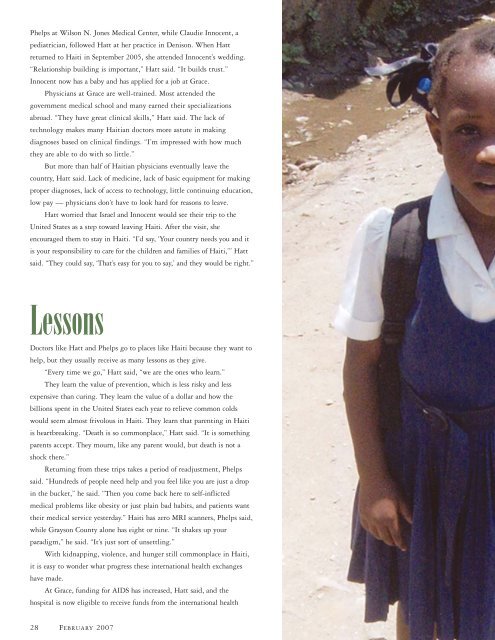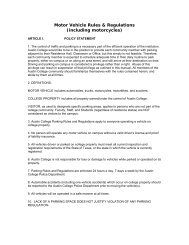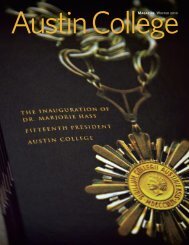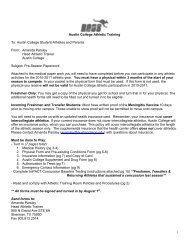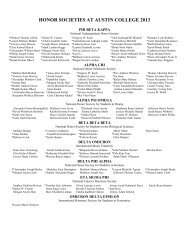February 2007 - Austin College
February 2007 - Austin College
February 2007 - Austin College
Create successful ePaper yourself
Turn your PDF publications into a flip-book with our unique Google optimized e-Paper software.
Phelps at Wilson N. Jones Medical Center, while Claudie Innocent, apediatrician, followed Hatt at her practice in Denison. When Hattreturned to Haiti in September 2005, she attended Innocent’s wedding.“Relationship building is important,” Hatt said. “It builds trust.”Innocent now has a baby and has applied for a job at Grace.Physicians at Grace are well-trained. Most attended thegovernment medical school and many earned their specializationsabroad. “They have great clinical skills,” Hatt said. The lack oftechnology makes many Haitian doctors more astute in makingdiagnoses based on clinical findings. “I’m impressed with how muchthey are able to do with so little.”But more than half of Haitian physicians eventually leave thecountry, Hatt said. Lack of medicine, lack of basic equipment for makingproper diagnoses, lack of access to technology, little continuing education,low pay — physicians don’t have to look hard for reasons to leave.Hatt worried that Israel and Innocent would see their trip to theUnited States as a step toward leaving Haiti. After the visit, sheencouraged them to stay in Haiti. “I’d say, ‘Your country needs you and itis your responsibility to care for the children and families of Haiti,’” Hattsaid. “They could say, ‘That’s easy for you to say,’ and they would be right.”LessonsDoctors like Hatt and Phelps go to places like Haiti because they want tohelp, but they usually receive as many lessons as they give.“Every time we go,” Hatt said, “we are the ones who learn.”They learn the value of prevention, which is less risky and lessexpensive than curing. They learn the value of a dollar and how thebillions spent in the United States each year to relieve common coldswould seem almost frivolous in Haiti. They learn that parenting in Haitiis heartbreaking. “Death is so commonplace,” Hatt said. “It is somethingparents accept. They mourn, like any parent would, but death is not ashock there.”Returning from these trips takes a period of readjustment, Phelpssaid. “Hundreds of people need help and you feel like you are just a dropin the bucket,” he said. “Then you come back here to self-inflictedmedical problems like obesity or just plain bad habits, and patients wanttheir medical service yesterday.” Haiti has zero MRI scanners, Phelps said,while Grayson County alone has eight or nine. “It shakes up yourparadigm,” he said. “It’s just sort of unsettling.”With kidnapping, violence, and hunger still commonplace in Haiti,it is easy to wonder what progress these international health exchangeshave made.At Grace, funding for AIDS has increased, Hatt said, and thehospital is now eligible to receive funds from the international health28 FEBRUARY <strong>2007</strong>


